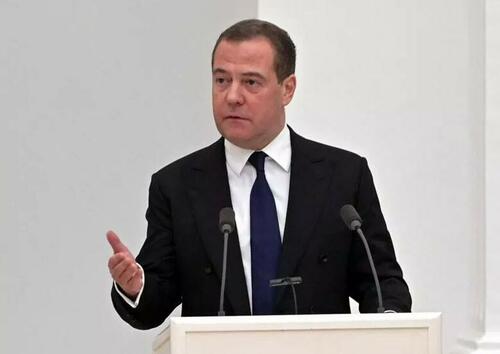Following wave after wave of sanctions threats and impositions, former Russian president Dmitry Medvedev predicted this week that there would be a number of global consequences.
Medvedev, who is deputy chairman of Russia’s Security Council, wrote on Telegram that the sanctions could be the spur to a new world order which Moscow has previously said it would welcome.
“As a result [of sanctions], a new security architecture will be created,” he said.
This would highlight, “the weakness of the Westernized concepts of international relations such as ‘order based on rules’,” Medvedev also predicted “the collapse of the idea of an American-centric world.”

In a post titled, “What will happen next, or the world after anti-Russian sanctions (not a forecast at all)“, Medvedev outlined in 10 bullet points how supply chains could collapse, inflation could spike and food and financial crises would ensue.
1. A number of global supply chains of goods will collapse, a major logistical crisis is possible, including the collapse of foreign airlines, which are banned from flying over Russian territory.
2. The energy crisis will intensify in those states that have imposed “shooting in their own feet” sanctions on the supply of Russian energy carriers, further growth in fossil fuel prices will continue, and the development of the digital economy in the world will slow down.
3. A full-fledged international food crisis will come with the prospect of starvation in individual states.
4. A monetary and financial crisis is possible in some countries or communities of countries, associated with the undermining of the stability of a number of national currencies, galloping inflation and the destruction of the legal system for protecting private property.
5. New regional military conflicts will arise in those places where the situation has not been peacefully resolved for many years or the significant interests of major international players are ignored.
6. Terrorists are becoming more active, believing that the attention of Western authorities today is diverted to a showdown with Russia.
7. New epidemics will begin, caused by the rejection of honest international cooperation in the sanitary and epidemiological sphere or by direct facts of the use of biological weapons.
8. There will be a decline in the activities of international institutions that have not been able to prove their effectiveness in the course of settling the situation in Ukraine, such as, for example, the Council of Europe.
9. New international alliances of countries based on pragmatic rather than ideological Anglo-Saxon criteria will be formed.
10. As a result, a new security architecture will be created, in which de facto, and then de jure, the existing realities are recognized:
a) the weakness of Westernized concepts of international relations such as “Order based on rules” and other senseless Western junk;
b) the collapse of the idea of an American-centric world;
c) the presence of interests respected by the world community in those countries that are in an acute stage of conflict with the Western world.
Medvedev’s gloomy picture of the future – a pivot away from the post-Cold War international order – echoes Russian President Putin’s comments right before he invaded Ukraine.